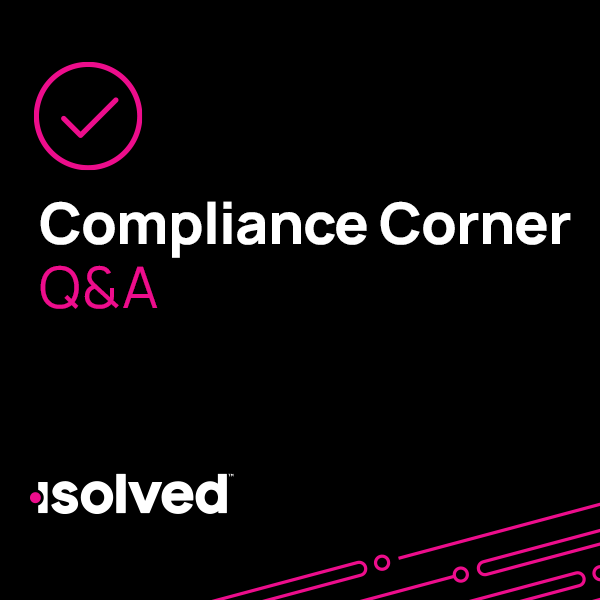Compliance Corner: Q&A on Internships
Friday August 27th, 2021
Estimated time to read: 5 minutes, 15 seconds

Have you ever thought about implementing an internship program within your organization? These programs can have many benefits, from helping your organization obtain a pipeline of fresh talent to strengthening its reputation and ties within the community.
In this month’s Compliance Corner blog, HR Business Partner for isolved People Services Kristin Wright is answering questions about internships. Find out what you need to know – including how to get started – by reading the Q&A below:*
1. Why should my business consider implementing an internship program?
Employers who implement internship programs reap a number of benefits. For employers who partner with specific schools, brand recognition and community involvement are key drivers for internship programs. Additionally, having an extra pair of hands on deck is always welcome.
The primary employer goal of establishing an internship program, though, is to build relationships with a pool of potential employees. Employers will have the ability to see the potential of an individual based on actual work performed, which is more beneficial than reviewing resumes.
2. What steps should be taken when developing an internship program?
Implementing an internship program isn’t difficult, but it requires some forethought and planning, including:
• Understanding the goals and objectives to implementing the program. For instance, how will the company benefit and how will the interns benefit?
• Developing the business case and gaining leadership buy-in.
• Designing the program. Consider the following:
-
-
- For which roles will you create internships? How will those roles complement existing roles? How can you ensure that the internship won’t take hours, opportunities or jobs away from other employees?
- What will the objectives be for each role?
- What is the timeline of the internship? When does it begin and end?
- Who will oversee each intern’s progress? How will you measure that progress?
- What will be the hours of each role? How long will the internship last?
- Will you partner with schools? If so, which ones?
- Do you plan to compensate interns in the program? If so, what will the compensation be?
- How should you onboard your interns? Should you conduct exit interviews?
- How will you determine the success of your internship program?
-
• Finally, putting your plan into action. Develop internship descriptions and objectives, post ads, evaluate candidates, and select and hire your interns.
3. Is there an age requirement for interns?
The Department of Labor doesn’t place any age restrictions on internships; however, organizations often place lower age limits that are aligned with their typical practices around hiring minors.
Employers should be mindful not to overstep the Age Discrimination in Employment Act (ADEA), which protects workers from illegal discrimination. Many older applicants may be just as qualified — or more qualified — than younger candidates.
4. How do I ensure interns receive academic credits?
Receipt of credits is not a requirement for an internship, however, ensuring interns receive academic credit is a great way to protect your internship’s status as unpaid.
The best way to do this is to partner with local schools that provide credits for internships. Many of these schools will even advertise the internships to appropriate candidates or provide job boards for you to do so. To get started, reach out to the internship coordinator at your local university.
If you can’t partner with a local school or wish to offer your internships to a broader market, you can’t guarantee the intern will receive educational credits. You can still do things that will improve an intern’s chances of receiving credit, though. Draft clear objectives of the internship, document the intern’s progress and achievements, and perhaps even provide a certificate at the end of the internship period.
5. How should my organization determine the hours and timeline for internships?
As a rule of thumb, an internship should typically last 3-6 months. An unpaid internship should last as long as you have new material to teach. Paid internships can last longer.
For unpaid internships, you must be careful not to have the internship conflict with the intern’s academic commitments. This means you may need to be flexible with hours of work. Paid internships are more flexible.
6. Am I required to pay interns? If so, how should I determine wages?
In January of 2018, the Department of Labor tossed its rigid six-factor test and implemented a Primary Beneficiary Test comprising seven key points to consider. The goal of this test is to consider the economic reality of the intern-employer relationship.
No single factor may disqualify an internship as unpaid. Rather, the internship should be looked at in its totality. The factors include:
• Whether there is clear understanding that there is no expectation of compensation.
• Whether the internship will provide training similar to what would be given in an educational environment.
• The extent to which the internship is tied to the intern’s formal education program. (e.g., Does it align with coursework and/or will the intern receive academic credit?)
• The timeline of the internship and how it corresponds with the intern’s academic calendar.
• The limitation of the internship to a period which provides the intern with beneficial learning.
• Whether the work complements, rather than displaces, the work of paid employees.
• The extent of understanding that the internship is conducted without entitlement to a paid job when the internship is over.
Every internship opportunity should be vetted against these factors to ensure it primarily benefits the intern.
State laws can be more restrictive than federal law and should be observed as well. For this reason, the simplest solution is often to pay the intern a legal wage. With paid interns, you will need to follow the Fair Labor Standards Act (FLSA) and the wage and hour laws of your state.
7. How should I recruit interns?
Before you begin recruiting interns, it’s important to understand what you want in an intern. For example; Do they already have specific skills? Are they taking courses aligned with the role? What is the availability of the ideal candidate?
Once you’ve determined what you need, you can recruit using your usual methods, such as LinkedIn, Indeed or isolved Hire. There are many internship-specific job boards available that would be ideal places to source candidates. You can also work with your partner school to source candidates or leverage campus recruiting events to find leads.
8. What steps should my HR team take to ensure interns have a good experience?
It’s always a great idea to check in with your interns to ensure a great experience. Check-ins allow you to discover whether your interns are learning and whether they are engaged with the organization.
Conducting exit interviews with departing interns is another great way to ensure that you continue to improve on your program as time goes on. Feedback will give you the information you need to adjust as you go.
9. Can I offer an intern a permanent position at the end of their internship?
If your internship is unpaid, be sure to follow the seven-factor “Primary Beneficiary” test. You should make it clear to these interns that there is no guarantee of a paid position at the close of their internships.
However, one of the best reasons to implement an internship program is to build relationships with future employees. You should offer great interns a permanent role if you have a space for them to enter that does not displace current employees. You should present the intern a new offer that explains how their relationship with the company is changing.
10. How should my organization evaluate the success of its internship program?
The success of your internship program will depend on the goals established for it. Success should be measured on two prongs: whether it met the company’s needs, and whether it met the intern’s needs.
To determine the former, measure your results against the goals of your internship program. You should have established these as you were developing your program.
Whether your goal was to develop brand recognition, positive community relations, relieve workloads or meet future employees, how will you measure those goals? What does it mean to be successful?
To determine whether the program successfully meets the goals and needs of the intern, you should consult your interns directly. Exit interviews are the best way to gather this feedback. Did your intern get the knowledge they needed? Did they get appropriate credits or a boost to their resume? Did they attain the skills they were after?
The important thing is that once you’ve measured your success, you act. Use that information to keep improving the program, both for your business and for your interns.
About Kristin:

Kristin is an HR Business Partner for isolved’s People Services team and has 10 years of broad HR experience. Her expertise is in performance management and employee relations, and she specializes in California labor law. Her background is in entertainment, tech and business services.
* This blog is not legal advice. Please seek proper legal advice.
Need assistance completing your critical HR tasks? Discover how isolved People Services can help.
This article has been read 5,216 times.
